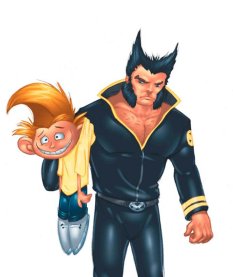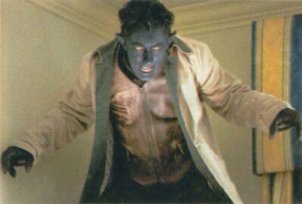| Words
and Pictures
The X-Men,
Marvel Comics' popular mutant heroes sworn to protect a world
that hates and fears them, were declared "nonhuman creatures"
in a Jan. 3 ruling by Judge Judith Barzilay of the U.S. Court
of International Trade.
This allowed
Marvel Enterprises Inc. to label action figures based on the
X-Men and other Marvel characters as toys - figures representing
animals or "creatures" - rather than dolls - toys
representing humans - and thereby win a lower duty rate on
figures imported from China in the mid-1990s.At
the time, the tariff code placed higher duties on dolls than
toys.
In the
words of the Comic Book Guy, "Worst ruling ever."
X-Men
fans were outraged that the courts would define their heroes
as anything less than human. They look different and their
DNA might deviate from the norm, but they have the same hopes,
fears and dreams that "normal" human beings do.
Why should the law view them any differently? More importantly,
why should anyone outside the cloistered world of comic book
fandom care? The answer is simple: the X-Men, for all their
spandex excess, represent the future of the human race.
Biotechnology
promises a world where parents can engineer their children
to be smarter and stronger than the norm. It promises a world
where splicing animal DNA with that of humans is a commonplace
procedure. It even promises a world where the blind will see
and the lame will walk thanks to mechanical cybernetic implants.
The citizens
of this brave new world will no longer be, in the strictest
biological sense, homo sapiens. But will they still be human?
Probably not. At least not in the eyes of the law.
America
has been attempting to define - and deny - personhood since
the days of the founding fathers. The Constitution enshrined
into law the idea that black slaves were only worth three-fifths
as much as free white men. Roe v. Wade declared that unborn
children are little more than extensions of their mothers
and therefore undeserving of the rights and protections given
to those the state recognized as full-fledged human beings.
Judge Barzilay's ruling, while not applicable to cases involving
human beings, is a good indicator of how the legal system
will view the genetically deviant citizens of the future.
In her
32-page decision, Judge Barzilay wrote that "a 'mutant'
is an individual … with freak or grossly abnormal anatomy,
abilities, etc." It may have once been a part of the
human species, but its mutation makes it "something other
than human."
The judge
makes a compelling case. Barring the existence of some ineffable
element like a soul, what is a man but the sum of his DNA?
Man has an awareness of self, but so do great apes. Man has
a more powerful mind than any found in nature, but IBM predicts
that computer brains will be the equal of human ones in terms
of sheer processing power within two years. Intelligence is
clearly no longer an adequate method of determining personhood;
therefore, the only legitimate definition of humanity is a
narrow one based entirely on specific genetic characteristics.
The biotech-created
mutants of the not-too-distant future obviously wouldn't make
the cut. Like the X-Men, their tailor-made genes would not
only set them apart from the teeming masses of humanity but
above them as well. Enhanced physical traits would give them
an unbeatable edge in sports competition while improved mental
faculties would ensure their dominance in business and the
sciences.
For the
first time in its history, mankind will no longer be the dominant
species on this planet. The last time this occurred was nearly
30,000 years ago when the dim-witted Neanderthals found themselves
competing with our more highly-evolved ancestors, the Cro-Magnons.
Guess who won and guess who only exists today in fossil form.
Fortunately
for us mere mortals, we no longer exist in a state of nature.
We now have the rule of law and its conveniently elastic definition
of personhood. All human jurists have to do is declare mutants
non-persons and let the legislators do the rest.
Congress
could pass laws barring mutants from running for public office.
They could enact legislation that would prevent mutants from
owning businesses or heading major corporations. They could
even curtail mutant breeding in order to keep them a minority.
Inevitably
the mutants would begin to chafe under this genetic apartheid.
They would strike back against their human oppressors - perhaps
violently. Acts of mutant terrorism would lead to reprisals
by the humans, which would in turn lead to even greater violence
on the part of the mutants. All-out war would ensue with victory
coming only through genocide: one species wiping the other
from the face of the earth. And have no illusions about which
species would emerge triumphant.
The future
does indeed look grim. All across the world scientists are
busy breeding our replacements - whether we want them to or
not. The science fiction of the X-Men will be the science
fact of tomorrow. The only real question left to us is whether
we will embrace them or attempt to destroy them.
If we
continue to define humanity in a solely quantitative way,
conflict is inevitable. A few microscopic strands of altered
DNA will forever separate man from mutant. There will never
be common ground unless we accept that there is something
transcendent about the human condition. The law must recognize
that both natural humans and lab-grown mutants alike are "endowed
by their Creator with certain unalienable Rights." Humanity
can no longer be defined as a function of the mind or the
body but of the heart and the soul.
For if
we label the X-Men nonhuman creatures today, what then will
we label our children tomorrow?
|








